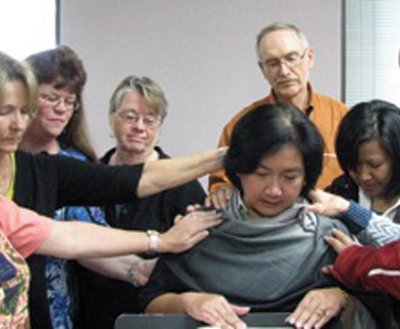Today I have the privilege of telling you about a fellow
columnist for The Dispatch. Her name is Kat Teraji, and she
writes
”
Making Connections
”
, which is a source of unending inspiration to her devoted
readers.
Today I have the privilege of telling you about a fellow columnist for The Dispatch. Her name is Kat Teraji, and she writes “Making Connections”, which is a source of unending inspiration to her devoted readers.
Kat was born in Fresno and grew up in Salinas. She majored in English literature at the University of California, Santa Cruz. As a child she loved to write, which influenced her choice of major; however, except for winning a few poetry contests, she didn’t become a published author until she became a columnist for the newspaper in 2001.
She was raised in a conservative, nondenominational church, but attended St. Thomas Episcopal Church when she lived with her husband in Sunnyvale. In fact, she attended an inquirers class in order to become a member of that parish, but changed her mind: Kat says she enjoyed the members of the congregation and its social conscience, but found the parish “too intellectual. I couldn’t find the heartbeat.”
When her family moved to Gilroy in 1999, she began “church-shopping,” looking for a congregation where she could feel comfortable and at home. She kept finding herself drawn to the Gilroy United Methodist Church, which she felt had the “perfect balance of heart and intellect.”
Soon she became active in the United Methodist Women, a charitable organization with more than 1 million members who work for women’s and children’s causes worldwide. In 2001, she became the mission coordinator for social action of the denomination’s San Jose District. This gave her an appreciation for the important role women play in the UMC, and soon she became active in the work of the California-Nevada Conference of the church, a group of 366 congregations throughout northern California and all of Nevada.
Although she considered entering seminary to become an ordained minister, instead Kat began classes to become a lay speaker. This role includes much more than preaching sermons, she discovered, as she took classes in leadership training, interfaith studies, how to plan worship services, and hospital and convalescent home visitation.
After serving her congregation in this role, Kat felt the call to get more training and entered an exclusive Conference Lay Ministry Training Program, which required detailed recommendations from five main leaders of her Gilroy church, including the pastor. After meeting a number of rigorous criteria, Kat entered the program last November at the UMC Center in West Sacramento.
The CLayM trains lay people for effective and expanded service in the local church and community. It was established to provide lay pastors when ordained clergy were not feasible for small churches. Now graduates also provide specialized ministries and other leadership.
Classes last two weeks, one session in November and another in January, lasting 12 hours per day, with assignments completed from home in between. The program was administered by retired Air Force officer, Pastor Perry Polk, and all instructors were top level experts in their field in the UMC. Among the topics explored were the following:
– Methodist heritage
– Pastor care
– Spiritual life
– Preaching
– Bible
– Christian education
– Stewardship
– Faith formation
– Church government.
Lay ministers have a record of successfully keeping churches open that would have closed otherwise. For example, the UMC in Boulder Creek has thrived under a lay minister for a decade. Three churches in the Sierras share a single lay minister who makes a circuit preaching among them each Sunday; this is a paradigm the early Methodists used in the sparsely-settled areas of the U.S. when the faith was transplanted here from England in the 18th century. Based on current economic circumstances, more churches, such as the Morgan Hill UMC, are unable to afford full time ordained pastors. About 30 new UMC lay ministers are being certified this year, more than ever before.
Kat has served the Gilroy UMC in many capacities over the years, from youth group leader to soup team coordinator for the homeless. When she graduated from this program in January, she became fully qualified to lead a congregation as a pastor, although the sacraments of communion and baptism must still be assisted by ordained clergy, a role often filled by retired pastors. Once each year, she will be asked if she is willing to lead a congregation, but unlike ordained clergy who have to accept appointments to churches, she is free to use her skills and gifts however she determines is best. As she continues her faith journey, she will discern where God intends to lead her.
Because of what Jesus Christ has done to transform her life from one of pain as a child who was physically abused into one of joy and fulfillment as an adult, she said her goal in serving is to express her gratitude to God for all that He has done and to share with others the healing and transformative power of God’s unconditional love for every person.
For more information, contact Kat at ka********@***il.net.












